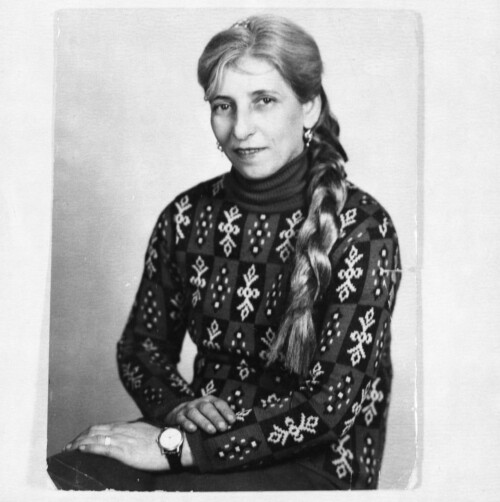
Alžběta Danielová
Alžběta Danielová, née Serynková, born 1924, Pilsen
-
Testimony abstract
Marie Serynková, the mother of Alžběta Danielová, lived with her four children in her own flat in Pilsen.
In 1942, when Alžbeta Danielová was sixteen years old, the Germans arrested the whole family. Their fellow citizens cried when they were taken away. They were fingerprinted, photographed, and a record was taken at Denisovo nábřeží [Denis Quay, in the building of the former police headquarters (ed.)]. The family assumed that they would be sent to work, not to die.
From Pilsen they were taken to Lety, where they spent about eight months; from there they were transported by cattle wagon to what she called “Osvěnčina” (the concentration camp Auschwitz-Birkenau). They were crammed into the train until they were unable to breathe. They could only take clothes, not any food or drink. They were guarded by German soldiers and one Czech gendarme. They reached their destination at about 6 o'clock [whether morning or evening is not stated]. It took them about three quarters of an hour to walk to the camp; on the way the SS men beat them, and they were all very afraid.
Once they got there, they were given prison clothing and were placed in quarantine, which lasted about two weeks; during that period they were shaved and tattooed. They were given food once a day, mostly made of beets and white carrots, which did not taste good, nor did the tea. There were up to five hundred prisoners on the block; the “block elders” were Czechs, Slovaks and Germans; the kapos were the cruellest. The conditions in the camp were appalling and diseases were rampant - most often typhus, dysentery and smallpox. She fell ill too and says she was left with after-effects; her sight is not good. Children and adults were operated on while conscious.
Every day she watched the gas chambers into which Jews disappeared, and heard their screams and cries. Those who tried to escape were tied to stakes or put in bunkers in which they could not sit or lie, only stand. Mrs Danielová did not remember all this well, she wrote: "I do not want to think about it or write about it."
From Auschwitz, she said, she was transferred to Ravensbrück and then to Wittenberg,[1] where they were liberated by the Red Army.
- [1] Female prisoners from Ravensbrück concentration camp were assigned to outside work teams, one of which worked in Wittenberg. (ed.)
She returned home to Pilsen with another Pilsen native, Vlasta Serynková.
How to cite abstract
Abstract of testimony from: NEČAS, Ctibor, ed. Nemůžeme zapomenout = Našťi bisteras : nucená táborová koncentrace ve vyprávěních romských pamětníků. Olomouc: Univerzita Palackého, 1994, 95-96. Testimonies of the Roma and Sinti. Project of the Prague Forum for Romani Histories, https://www.romatestimonies.com/testimony/alzbeta-danielova-roz-serynkova (accessed 4/19/2025) -
Origin of Testimony
The testimony was written by Alžběta Danielová herself on 22 September 1987.
-
Where to find this testimony




